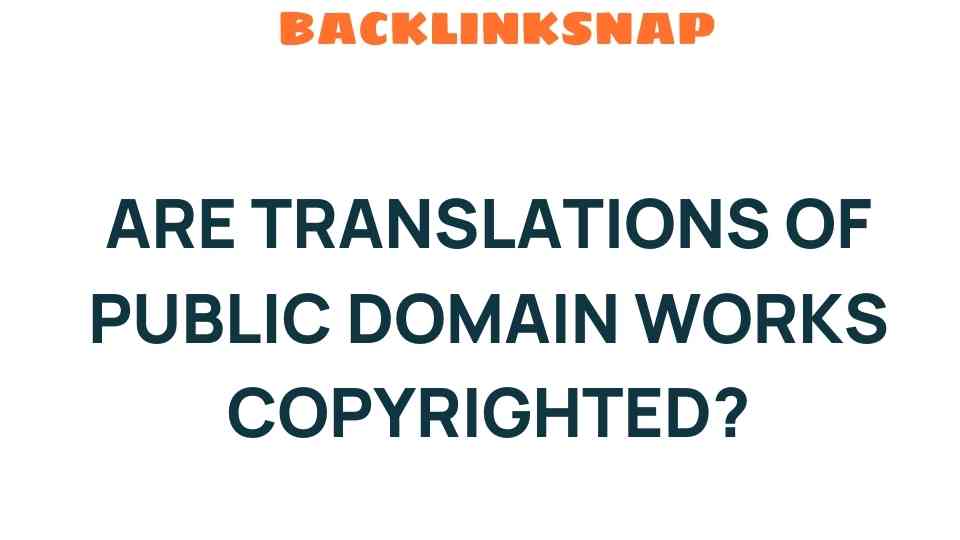Are Translations of Public Domain Works Copyrighted?
In the realm of public domain works, the question of copyright surrounding translations often arises, leading to confusion and misconceptions. Understanding the intricate relationship between translations and copyright requires an exploration of intellectual property laws and the nature of creative works. This article aims to clarify whether translations of public domain works are copyrighted, shedding light on the legal implications and cultural heritage associated with these translations.
The Essence of Public Domain
Public domain refers to creative works that are not protected by copyright laws, allowing anyone to use, modify, and distribute them without seeking permission or paying royalties. Works enter the public domain for various reasons, including:
- Expiration of copyright: Copyright usually lasts for a specific duration, after which the work becomes part of the public domain.
- Failure to meet copyright requirements: Some works may never have been eligible for copyright protection.
- Intentional dedication: Authors may choose to place their works in the public domain to encourage free use.
Examples of public domain works include classic literature, historical documents, and scientific publications, which form a vital part of our cultural heritage. These works are valuable resources for education, research, and creative endeavors.
Understanding Copyright in Translations
When it comes to translations, the question becomes more nuanced. A translation is often considered a “derivative work,” which means it is based on an existing work but presents it in a new form. The legal status of translations hinges on several factors:
- Original Work Status: If the original work is in the public domain, the translation itself can be created without infringing on copyright.
- Translation Rights: Translators may claim copyright over their specific translations, even if the original text is public domain.
- Creative Input: The degree of creativity involved in the translation process can also influence copyright claims.
Thus, while the original public domain work is free to use, the translation may carry its own copyright, depending on these factors.
Legal Implications of Translating Public Domain Works
When translating a public domain work, one must be aware of the legal implications that may arise:
- Copyright Ownership: A translator has copyright over their translation, which means they can control how it is used, reproduced, and distributed. This applies even if the source material is in the public domain.
- Licensing Opportunities: Translators can license their translations to publishers or other entities, creating potential revenue streams.
- Attribution and Moral Rights: In some jurisdictions, translators may have moral rights that allow them to claim authorship of the translation and prevent it from being altered without their consent.
These factors illustrate the importance of recognizing the translator’s contribution while respecting the freedoms afforded by public domain status.
Cultural Heritage and the Role of Translations
Translations play a critical role in preserving and sharing cultural heritage. They allow diverse audiences to access literature, philosophy, and historical texts that would otherwise remain inaccessible due to language barriers. By translating public domain works, translators contribute to the global exchange of ideas and knowledge.
However, the complexities surrounding copyright and translation rights can create hurdles for translators. Many may feel discouraged from translating public domain works due to uncertainty about their rights over the resulting translations. This highlights the need for clear guidelines and support for those wishing to engage in this vital cultural activity.
Best Practices for Translators
For translators working with public domain texts, adhering to best practices can help navigate the complexities of copyright:
- Research Copyright Status: Always verify that the original work is indeed in the public domain in your jurisdiction.
- Document Your Work: Keep records of your translation process and any creative elements you introduce.
- Consider Licensing: If you plan to publish or distribute your translation, consider applying for copyright or using Creative Commons licenses to specify usage rights.
- Seek Legal Advice: When in doubt, consulting with an intellectual property attorney can provide clarity on your rights and responsibilities.
By following these practices, translators can confidently contribute to the dissemination of public domain works while protecting their creative contributions.
Frequently Asked Questions (FAQs)
1. Can I translate a public domain book and publish it?
Yes, you can translate a public domain book and publish your translation. However, you will hold copyright over your specific translation.
2. Are all translations of public domain works automatically public domain?
No, while the original work may be public domain, the translation can be copyrighted. You will need to check the copyright status of the translation.
3. Do I need permission to translate a public domain work?
No, you do not need permission to translate a public domain work; however, you may wish to credit the original author.
4. What rights do I have as a translator of a public domain work?
As a translator, you have copyright over your translation, allowing you to control its use and distribution.
5. Can I alter my translation of a public domain work?
Yes, you can alter your translation as you see fit, given that you hold the copyright to your version.
6. How can I find public domain works to translate?
Many resources are available, including Project Gutenberg and the Internet Archive, where you can find a wealth of public domain texts.
Conclusion
In conclusion, translations of public domain works are not automatically copyright-free; they hold their own copyright due to the translator’s unique contributions. Understanding these nuances is vital for anyone interested in translating works that belong to our shared cultural heritage. By embracing the freedom that public domain offers and respecting the creative rights of translators, we can foster a rich exchange of ideas across languages and cultures.
For more information on copyright and public domain works, you can visit this resource or explore guidelines from organizations like Creative Commons.
This article is in the category Digital Marketing and created by BacklinkSnap Team




